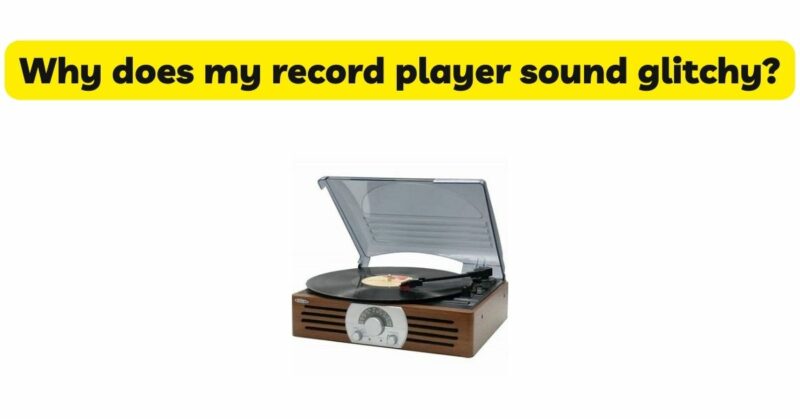Experiencing glitchy sound on a record player can be frustrating and can significantly diminish the quality of your vinyl listening experience. These sound glitches can manifest as pops, crackles, skips, or other irregularities that disrupt the smooth playback of the music. Several factors can contribute to glitchy sound on a record player, including issues with the vinyl record, the stylus, the turntable components, or environmental factors. In this article, we will explore common causes of glitchy sound on a record player and provide troubleshooting tips to help you diagnose and potentially resolve the issue.
- Dirty or Damaged Vinyl Records: One of the primary causes of glitchy sound on a record player is dirty or damaged vinyl records. Dust, dirt, or debris on the record surface can cause pops, crackles, or skips during playback. Similarly, scratches or warping of the record can lead to irregularities in sound reproduction. Cleaning vinyl records using appropriate cleaning methods and handling them with care can help reduce these issues. Using a record brush or cleaning solution to remove dust and dirt, and avoiding excessive handling or mishandling of records, can help improve playback quality.
- Worn or Misaligned Stylus: The stylus, also known as the needle, is responsible for tracking the grooves on the vinyl record and converting the physical movements into an electrical signal. A worn or damaged stylus can cause glitchy sound as it struggles to maintain proper contact with the record’s grooves. Additionally, a misaligned stylus can result in uneven tracking and cause skips or distortions in the audio. Regularly checking the condition of the stylus and replacing it when necessary, as well as ensuring proper alignment, can help alleviate these issues.
- Turntable Setup and Calibration: Proper setup and calibration of the turntable are crucial for optimal sound reproduction. Issues such as improper tracking force, incorrect anti-skate settings, or imbalanced tonearm can contribute to glitchy sound. Inspecting and adjusting these settings according to the manufacturer’s guidelines can help improve playback performance. Balancing the tonearm, setting the tracking force correctly, and adjusting the anti-skate to match the cartridge specifications can minimize sound irregularities.
- Tonearm Lifting Mechanism: Glitchy sound can also occur if the tonearm lifting mechanism is not functioning correctly. If the tonearm does not lift or lower smoothly or if it lifts or drops suddenly during playback, it can cause skips or other audio disturbances. Checking the tonearm lift mechanism for any obstructions, ensuring proper lubrication, and adjusting the lift control can help resolve this issue.
- Faulty RCA Connections: RCA connections, which carry the audio signal from the turntable to the amplifier or receiver, can be another source of glitchy sound. Loose or damaged RCA cables or connectors can result in intermittent audio interruptions or distortions. It is important to check the RCA connections and ensure they are secure and in good condition. Replacing faulty cables or connectors can help improve sound quality and minimize glitches.
- Electrical Interference: Electrical interference from nearby electronic devices can introduce glitches into the audio signal. Devices such as smartphones, computers, or Wi-Fi routers can generate electromagnetic fields that interfere with the delicate analog signal from the turntable. Placing the record player away from such devices or using shielded cables can help reduce electrical interference and minimize glitchy sound.
- Environmental Factors: Environmental conditions can impact the performance of a record player. Temperature and humidity fluctuations can affect the stability of the turntable components and the vinyl record itself, leading to glitchy sound. High humidity levels can increase record surface noise, while low humidity can cause static buildup. Maintaining a stable and suitable environment for the record player, including moderate temperature and humidity levels, can help minimize these issues.
Conclusion: Glitchy sound on a record player can be attributed to a variety of factors, including dirty or damaged vinyl records, worn or misaligned stylus, improper turntable setup, faulty RCA connections, electrical interference, and environmental factors. By understanding these causes and following the troubleshooting tips provided, you can diagnose and potentially resolve the glitchy sound issue. Regular maintenance, such as cleaning records and stylus, ensuring proper setup and calibration, checking and securing connections, and minimizing electrical interference, can significantly improve the sound quality and enhance your vinyl listening experience. If the problem persists, it may be advisable to consult a professional technician for further assistance in diagnosing and resolving the glitchy sound issue.


